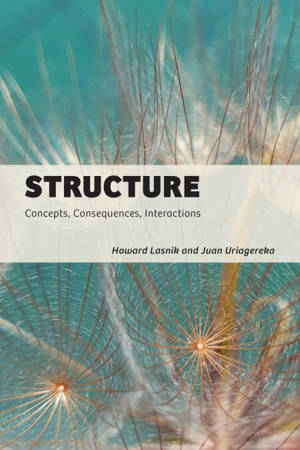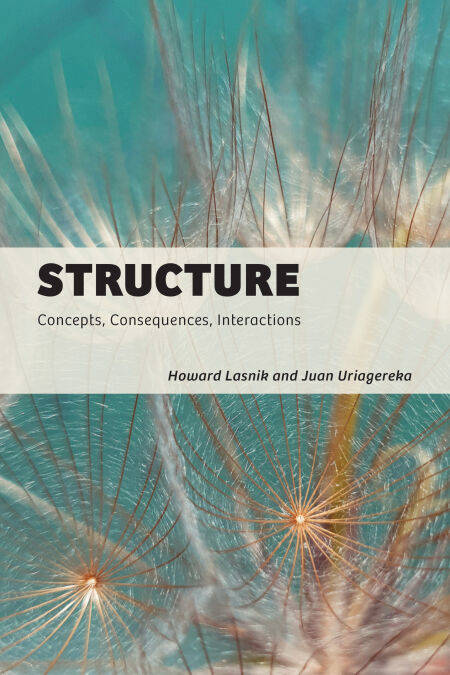
- Afhalen na 1 uur in een winkel met voorraad
- Gratis thuislevering in België vanaf € 30
- Ruim aanbod met 7 miljoen producten
- Afhalen na 1 uur in een winkel met voorraad
- Gratis thuislevering in België vanaf € 30
- Ruim aanbod met 7 miljoen producten
Zoeken
Structure E-BOOK
Concepts, Consequences, Interactions
Howard Lasnik, Juan Uriagereka
E-book | Engels
€ 44,35
+ 44 punten
Omschrijving
Natural phenomena, including human language, are not just series of events but are organized quasi-periodically; sentences have structure, and that structure matters.
Howard Lasnik and Juan Uriagereka “were there” when generative grammar was being developed into the Minimalist Program. In this presentation of the universal aspects of human language as a cognitive phenomenon, they rationally reconstruct syntactic structure. In the process, they touch upon structure dependency and its consequences for learnability, nuanced arguments (including global ones) for structure presupposed in standard linguistic analyses, and a formalism to capture long-range correlations. For practitioners, the authors assess whether “all we need is Merge,” while for outsiders, they summarize what needs to be covered when attempting to have structure “emerge.”
Reconstructing the essential history of what is at stake when arguing for sentence scaffolding, the authors cover a range of larger issues, from the traditional computational notion of structure (the strong generative capacity of a system) and how far down into words it reaches to whether its variants, as evident across the world’s languages, can arise from non-generative systems. While their perspective stems from Noam Chomsky’s work, it does so critically, separating rhetoric from results. They consider what they do to be empirical, with the formalism being only a tool to guide their research (of course, they want sharp tools that can be falsified and have predictive power). Reaching out to skeptics, they invite potential collaborations that could arise from mutual examination of one another’s work, as they attempt to establish a dialogue beyond generative grammar.
Howard Lasnik and Juan Uriagereka “were there” when generative grammar was being developed into the Minimalist Program. In this presentation of the universal aspects of human language as a cognitive phenomenon, they rationally reconstruct syntactic structure. In the process, they touch upon structure dependency and its consequences for learnability, nuanced arguments (including global ones) for structure presupposed in standard linguistic analyses, and a formalism to capture long-range correlations. For practitioners, the authors assess whether “all we need is Merge,” while for outsiders, they summarize what needs to be covered when attempting to have structure “emerge.”
Reconstructing the essential history of what is at stake when arguing for sentence scaffolding, the authors cover a range of larger issues, from the traditional computational notion of structure (the strong generative capacity of a system) and how far down into words it reaches to whether its variants, as evident across the world’s languages, can arise from non-generative systems. While their perspective stems from Noam Chomsky’s work, it does so critically, separating rhetoric from results. They consider what they do to be empirical, with the formalism being only a tool to guide their research (of course, they want sharp tools that can be falsified and have predictive power). Reaching out to skeptics, they invite potential collaborations that could arise from mutual examination of one another’s work, as they attempt to establish a dialogue beyond generative grammar.
Specificaties
Betrokkenen
- Auteur(s):
- Uitgeverij:
Inhoud
- Aantal bladzijden:
- 248
- Taal:
- Engels
Eigenschappen
- Productcode (EAN):
- 9780262371988
- Verschijningsdatum:
- 12/12/2022
- Uitvoering:
- E-book
- Beveiligd met:
- Adobe DRM
- Formaat:
- ePub

Alleen bij Standaard Boekhandel
+ 44 punten op je klantenkaart van Standaard Boekhandel
Beoordelingen
We publiceren alleen reviews die voldoen aan de voorwaarden voor reviews. Bekijk onze voorwaarden voor reviews.







